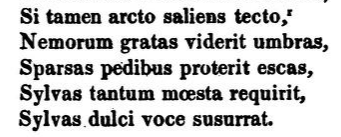Chaucer and “Twitter”
The Atlantic Magazine recently mentioned a tweet from the Oxford English Dictionary noting that Geoffrey Chaucer has the earliest attested use of the word “twitter”. It comes from his translation of Boethius’s “De Consolatione Philosophiæ”, which he called “Boece” (1380).
The usage in question is (in Middle English)
Or:
Yet nevertheless, if such a bird springs out of her tight cage, sees the agreeable shadows of the woods, she befouls with her feet her scattered food, and seeks mourning only the wood and twitters desiring the wood with her sweet voice.
Chaucer was translating Boethius’s original Latin. I was interested to see what word he attempted to capture. The original sentence was:
The last line is “whispers to the woods with her sweet voice”, so the word in question here is “susurrare”, “to whisper or murmur”
Chaucer was also consulting Jean de Meun’s 13th-century translation written in Old French to guide his own. Meun’s translation was:
Other than “douce voiz”, i.e., “sweet voice” there is nothing there alluding to the timbre of this voice. It seems to be an affectation that Meun ignores and Chaucer retains.
The next most recent attestation to “twitter” according to the OED is from John Trevisa’s translations of Ranulf Higden’s Prolicionycion (1387)
Or:
In town as it longes (lounges)
The osel (blackbird) twitters in merry songs
At night for dread
Truly no song does he grede (cry out)
The original Latin here reads:
So, “pulchris zinzitat”; or “chirps beautifully”. So Trevisa was translating the rarer word “zinzitare”.
It’s interesting that “susarrare” and “zinizitare” both have a dual constant sound “s-s”, “z-z” similar to “twitter”, “t-t”. In all cases they are onomatopoetic. Also, recent scholar ship has Chaucer writing ‘Boece’ in ~1380, not 1374 as the OED lists, and Trevisa started writing is translation in 1385 bring the dates of their usage closer together. It’s impossible to say if Chaucer actually coined the word and Trevisa made use of it, or if it was in usage during that time.
The OED gives the etymology of “twitter” simply as: “Of imitative origin: compare Old High German zwizirôn , -erôn”. There’s no indication of any Latin derivation, but I can help but noticing the similarity between “zwizerôn” and “zinzitare”. Ultimately it may be that Chaucer simply was groping for a more poetic word with avian connotations given the context and chose one with both a direct influence from the low countries and had a close analogue in Latin.






